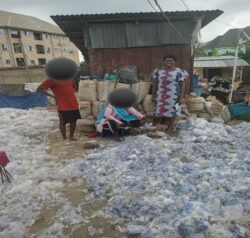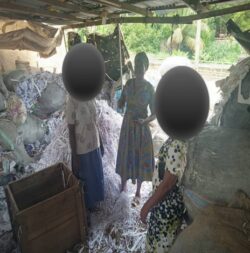An update from Adaobi Muo, one of our Lucas-Lahri fellows
Dr Adaobi Muo, one of our Lucas-Lahri fellows, has been in touch with an update about her current project, A Cry for Help: Advocacy for Ecological Recuperation in Selected South-eastern
Nigerian Locations. Read all about it below:
Introduction
My on-going research examines how African ecological crisis is being remediated through reprocessing/recycling activities of overlooked change agents, whose efforts at securing livelihoods have the (un)intended benefit of environmental regeneration. Attention is called to waste management as the world gets more injured by pollution, (NASA 2022; AQLI 2020, EPI 2022; UNEP 2021). Thus, scholars, like John Scalan (On Garbage 2005) and Patrick Oloko (“Human Waste/Wasting Human” 2021), conceptualise trash as treasure, and means of examining and comprehending socio-economic and political behaviours.
Eco-restoration and Stories
As an African literary scholar fascinated with environmental issues, I marched into my research locations in Aba and Onitsha (Nigeria) and encountered visible and muted stories, in personal and public narratives of scavengers and creative recyclers. Shari Stone-Mediatore (Reading across Borders: Storytelling and Knowledges of Resistance 2003) asserts that personal stories are not "mere stories" and highlights their capacity to contest "basic norms and categories … reclaim … revalue," facilitate examination and comprehension of marginalised experiences. (161; 143; 152).
In May and June, I collected eight personal and public stories and pictures from fifteen female and three male scavengers/creative recyclers of sachet water, plastic bottle, fabric and paper wastes, recovered from dumpsites, streets, etc., in six major locations, using mainly interviews, FGDs and observation. Analysis of data shows a significant level of economically-motivated engagement in eco-recuperation, especially by underprivileged married women, between thirty and fifty years, whom circumstances have compelled to turn to the earth for their sustenance. My research discovered the practical processes of converting waste into usable functional/aesthetic materials like waterproofs, Human hair and paintings. Remarkably, manual recyclers run about ten-hour six-days-a-week working schedule, in non-conducive environments, with relatively poor earnings of about N100,000, monthly, as determined by the male proprietors of three recycling plants, using measuring scales.
Conclusion
In the unfinished attempt at studying and detailing how ecocide is being remedied in Nigeria through reprocessing and recycling activities of disregarded mediators, I met personal and general stories. The narratives are enabling a deeper examination and better comprehension of African ecological crisis, towards achieving the SDG 15 – protection, restoration and promotion of sustainable use of the ecosystem.
Aba Wednesday 31st May 2023 – researcher, with two water sachet waste recyclers in a recycling location

Onitsha, Thursday 15th June 2023 - researcher (middle), with paper waste collector and a research assistant in a waste paper dump.

Topic: A Cry for Help: Advocacy for Ecological Recuperation in Selected South-eastern
Nigerian Locations
Researcher: Adaobi Muo (Ph.D.) A.muo@leeds.ac.uk and deskola2011@gmail.com
Institution: National Institute for Nigerian Languages (NINLAN), Aba, Abia State, Nigeria
Mentors: Prof. Adriaan van Klinken and Dr. Brendon Nicholls
